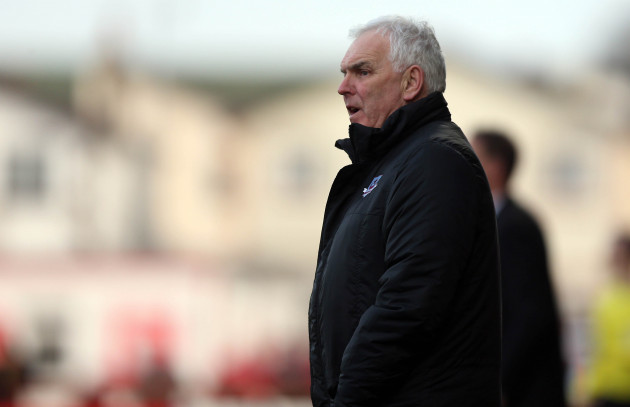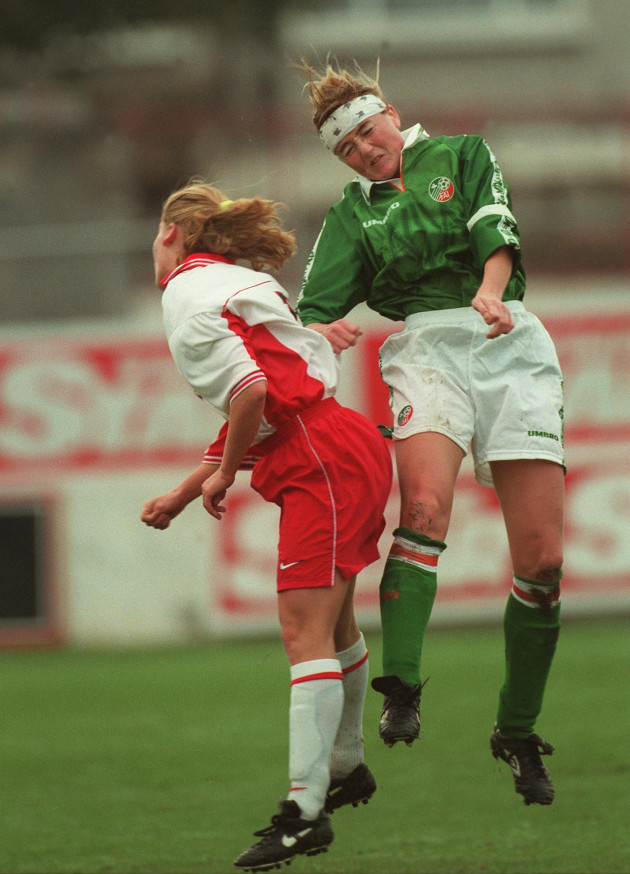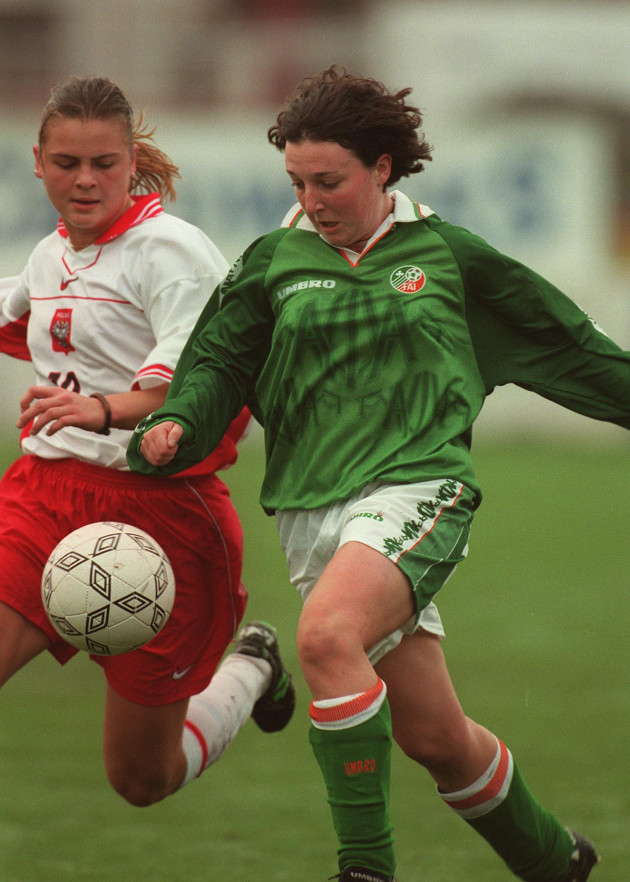WHEN YOU hear of trailblazers who paved the way for the current Irish team and the success they are enjoying at the 2023 Women’s World Cup, Yvonne Lyons is a name that often comes up and with good reason.
The Waterford native, who recently turned 59, was a key player for Ireland during a significant portion of the 1980s and ’90s.
She won 32 caps, 20 of which were as captain, at a time when women’s international matches took place far more sporadically than they do now.
Between 1992 and 1998, she was nominated for FAI Player of the Year five times, winning twice, with Fran Rooney, Linda Gorman and Mick Cooke among the managers she played under.
Yet none of it would have occurred had she listened to the less-than-friendly advice offered to her by a nun as a youngster during the 1970s.
“We lived in London for a few years when I was very young,” she tells The 42. “And I used to play soccer with the boys in the playground. And I remember one day, one of the nuns called me in and said: you won’t be playing, that’s a boys’ game. That’s a man’s game, you’re not playing that anymore.
“So I wasn’t allowed to play. It meant then that I didn’t play until I came back to Ireland.
“And I was back in Ireland when I was 14, but I didn’t play with [Waterford side] Benfica until I was probably 17 or 18 because I didn’t know there were women’s soccer teams around.
“Because of that experience, I [was under the impression] it was ‘a man’s game,’ I wasn’t aware that there were other teams around.
“So once I started playing with Benfica down here, that changed everything.”
Lyons was around 11 years of age when issued this warning and so missed out on about six years of playing the sport growing up.
“I mean, I played every other sport that you could think of so it wasn’t like I wasn’t playing sport, which would have benefited me anyway [in my future soccer career],” she says. “I played everything else: athletics, hockey, everything. So it was just a matter of getting the knack back.
“In those days, girls didn’t play soccer from that age anyway, it wasn’t like now where they play with boys up to the age of 12 or whatever age it is. That didn’t happen then.”
Lyons insists she didn’t take the nun’s words too seriously or consider what she was doing to be in any way sinful, despite coming from a relatively religious background herself.
“I didn’t think of it that way. My mother would have been old-style alright and the Catholic Church was everything but to me, it was just downright: ‘How dare she tell me I can’t play when I wanted to play,’ but that was the rule and I couldn’t do anything about it really at the time.
“But no, it certainly didn’t impact me from a religious point of view. I’m a good Christian but I’m not a Holy Joe.”
In that era, female athletes were seldom shown on TV and Lyons’ father died when she was young, so it was mainly her brothers and older sister that encouraged her to pursue sport.
And she didn’t just play but often excelled at sports outside of soccer — she was a champion kickboxer and particularly proficient at athletics events like the javelin and shot put.
Soccer, though, was her primary passion, even though it didn’t always love her back.
“Now they have so much more,” Lyons says. “We had the bare scraps of everything. We didn’t get a lot. We didn’t get money financially, even the expenses were very poor, but at the time, it just didn’t bother me.”
The early days at Benfica were often unpromising, especially when the team started transitioning from playing locally to coming up against Dublin sides.
“We thought we were fairly handy. But we decided we’d join the Dublin league. We got our comeuppance then because in the first game we were beaten about 10-0 and we didn’t understand offside, there were loads of things that we had never come across before because we were so green, I suppose, just playing in our own little backyard.”
Eventually, though, they got to grips with their surroundings and significant success ensued.
“We won the LFAI cup, we won everything,” she recalls. “There were things that happened all around the country that we actually were winning as well down the road because we had got that experience playing with the better teams.”
International recognition followed for Lyons, though it wasn’t always as glamorous as it sounded.
The young centre-back had to balance her footballing commitments with a full-time finance job with Bosch + Lomb, for whom she spent more than 20 years working.
The trips for matches were fun though often chaotic, and so it’s perhaps no surprise that the abiding ambition of qualifying for a major tournament took so long to come to fruition.
One of the most infamous away games took place as Ireland opened their 1999 World Cup qualification campaign in Mogilev, Belarus.
The team initially flew to Frankfurt, then took a second flight to Minsk and thereafter, they had a three-hour bus journey to Mogilev.
According to an Irish Times article from 1997, Mick Cooke’s side “had been warned about it being so close to Chernobyl and were advised not to eat certain things”.
To prepare for this issue, the Irish team had arranged for huge containers of food to be brought in from back home, but they never reached Mogilev.
They weren’t completely devoid of supplies, however, as boxes of Snickers and Ballygowan successfully made the trip across.
Having to rely on this unorthodox diet was not the only problem they encountered.
“The hotel was like, minus two stars or whatever,” remembers Lyons. “The net curtains were just full of holes. The water was brown, the baths were brown — everything was brown because of the water quality.
“The beds had holes in the sheets. It was just really bad. So we all slept in our tracksuits and nobody had a shower, only on the day of the match, you wouldn’t believe the pitch was like fecking Wembley. We were living in all this poverty and yet the pitch and everything was beautiful, perfect.
“So that night we got there, we were starving and they offered us chicken and chips. I’d say half the girls didn’t eat anything. I ate a bit because that’s the way I was. I had to eat my food.”
Lyons continues: “That morning I went for a walk with my friend [and international teammate] Siobhan Furlong and we went into a church just to say a prayer before the match.
“We just went for a walk and went in.
“It was absolutely full to the brim. Obviously, lots of people go to mass on a Sunday. But the poverty around was unbelievable.
“I think it was all to do with the radiation. There was nothing growing. It was just horrendous really, the conditions they were living in.”
But perhaps the most surreal moment of the trip was when the Irish squad found themselves in the middle of a Belarussian wedding with Russian music blaring and one of the players was “whipped up by this fella to dance” following their return to the hotel they were staying in.
Lyons adds: “All beautiful women all around and the guys were all there, sitting with their bottles of vodka in the middle of the table, taking their shots and 20 odd [squad members] arrived straight in the middle of their wedding. I couldn’t believe it, it was like something you see out of I don’t know what.
“We got our food and headed off then back to our rooms. Played the match. Literally, we got up the next morning and again, they’d given us scrambled eggs. You had to eat something before the match because you had to play a game. We hadn’t eaten much the night before.
“So we just had to have the Snickers, though some were tempted to have the eggs. And we went off then and played the match. But literally, it was like the last person turned off the lights, and we were gone.”
And how did the wedding guests feel about an international football team crashing their party?
“From what I remember, I don’t think they really took much notice of us, they just got on with their dancing and whatever they were doing. I suppose they couldn’t do anything about it.
“Maybe they were just told we were coming in. I’m not sure. But there didn’t seem to be any animosity towards us or anything like that.”
Perhaps the most remarkable detail is that despite this highly unusual pre-match build-up, Ireland ended up winning the qualifier 1-0.
It was a largely backs-to-the-wall performance aided by a strong display from Lyons at the back.
Young midfielder Rosie Power managed to nick a goal 10 minutes after the break as Ireland’s (literally and figuratively) hungry players clung on for an important victory.
But perhaps unsurprisingly, the national team were not successful in the long term, as Poland finished six points ahead of them and grabbed the sole spot to advance in a group that also featured Wales.
It was far from the only “memorable” trip, with Lyons also citing a match against the Faroe Islands.
“That was where you flew into one place, then you had to get boats, cars and trains to get to where we were staying.
“We finally got there. And the hotel was lovely. It was probably the only hotel where we were anywhere. The Scottish men’s team had stayed there previous to us.
“But the day of the match, you talk about the four seasons in Ireland, there were hailstones now, I’d say that were as big as golf balls. They were huge and would actually hurt you. Rain, wind, and sun [were also palpable]. And one of the girls actually got her eyes split open. So the doctor came along. ‘Sorry, I have no anaesthetic.’
“They just had to sow her up there and then literally. She didn’t bring anything with her. And there were a few memorable things like that alright.
“Pretty much we went to countries that you might never go back to again. So that was good in some ways. We got to see places.”
As entertaining as these stories are, they also provide an insight into the shameful conditions that female footballers consistently had to put up with.
“You wouldn’t see the likes of it now, put it like that,” says Lyons. “I mean, things have come on so much. You remember those kinds of trips because they were just so way out. And you had so much fun. I mean, it’s much more professional now. And it has to be in order for [the current Irish team] to achieve what they’ve achieved.”
Reflecting on her career, Lyons urges young female footballers to “strive for your best and enjoy it and don’t let anyone tell you differently,” adding: “I suppose, nowadays, it’s different. You’re accepted no matter what you play or what you do. In those days, if women played soccer, there was a big taboo about it.”







